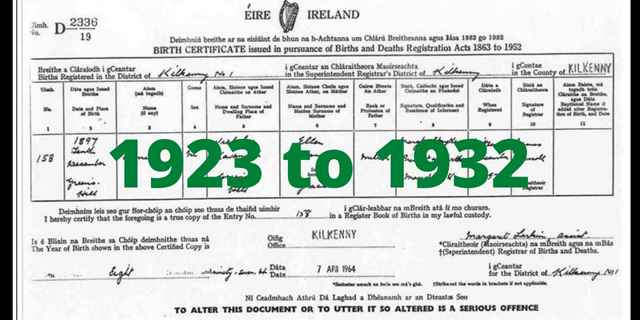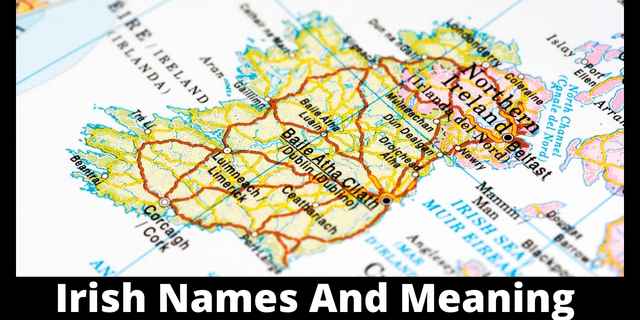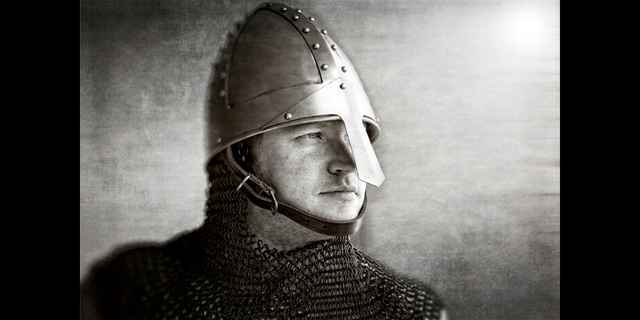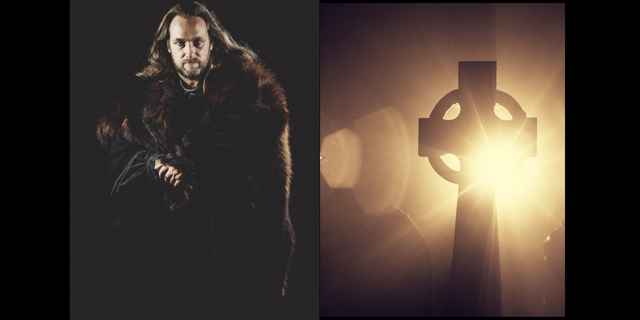Are you interested in the origins and meaning of an Irish last name that begins with F?
This article lists over one hundred Irish surnames that had birth registrations in early 20th century Ireland and also appear in the 2010 American census.
We’ll also give the origins and meanings of the most popular names.
Most Common Irish Surnames Starting With F

Let’s start with Irish names that had at least ten thousand bearers in the U.S. census.
| Last Name | Irish Births 1923-1932 | 2010 U.S. census |
| Fitzgerald | 2,711 | 75,356 |
| Flynn | 3,067 | 63,400 |
| Farrell | 2,615 | 52,321 |
| Foley | 2,038 | 51,865 |
| Fitzpatrick | 1,890 | 40,449 |
| Flanagan | 1,369 | 30,887 |
| Finn | 907 | 20,852 |
| Ferris | 80 | 20,703 |
| Flaherty | 921 | 17,926 |
| Fagan | 613 | 17,501 |
| Foy | 222 | 12,952 |
| Fallon | 653 | 11,974 |
| Finnegan | 556 | 11,695 |
| Flannery | 364 | 10,497 |
| Ferry | 193 | 10,312 |
Why take Irish birth registrations from 1923 to 1932?
The second column is the number of Irish birth registrations over a ten-year span starting in 1923.
The reason I chose that start date was that the Republic of Ireland was established the previous year. Starting in 1923 excluded birth locations in Northern Ireland.
Otherwise, the number of English and Scottish names would take longer to filter out of this list.
Origins And Meanings Of Irish Surnames Starting With F

Let’s run through the origins and meanings of these top names.
I’ve grouped them separately to how I ordered them by number in the list above. I’ve tried to put names with similar meanings and origins together.
Fitzgerald
This name has what’s known as Anglo-Norman origins. The “Fitz” is the give-away. But who were the Anglo-Normans?
After William the Conqueror led the Norman Conquest of Britain, the Normans who settled in England (the Anglo-Normans) then spread through Ireland.
The Anglo-Norman leader, Strongbow, sent a small band of knights to invade southern Ireland in 1169. One of those knights was Raymond Fitzgerald.
“Fitz” means “son of” or “descendant of”, so the name Fitzgerald means “son of Gerald”.
The first Gerald was a Norman who settled in Wales called Gerald Fitzwalter. His grandson was Raymond Fitzgerald.
The Fitzgeralds generally point to Raymond as the start of their Irish lineage.

Flynn, Flanagan, and Flannery
These are all different family names. But their Irish origins are similar.
They are all Anglicized forms of a Gaelic name Ó Floinn. I explain “Anglicization” more fully in a later section.
Here, I’ll simply say that it’s a way of taking an old Gaelic surname and turning it into a name that sounds or seems English.
The “Ó” in Ó Floinn means “descendant of”, so this name means the descendant of Floinn. That is a first name that gets Anglicized as Flann.
The meaning of Floinn comes from the Gaelic word for a ruddy or red complexion.
Flanagan is the English form of the Gaelic name Ó Flannagáin. You can clearly see the Flann part at the beginning of the name. But what about the rest?
That is a diminutive i.e. a pet form of the original name.
Flannery is a form of the Gaelic name Ó Flannghaile. This means the descendant of Flannghal.
The meaning comes from the Gaelic words for ruddy/red (floinn) and valour (gal). In other words, the name refers to the courageous man of ruddy complexion.
Valour tends to be related to battles and wars, so the name could be adopted by early chiefs.
Farrell
Valour turns up again with this common Irish name.
It’s an Anglicized form of the Gaelic name Ó Fearghaile, which is the descendant of Fearghal.
Fearghal or Fergal is also a common Irish first name. The meaning comes from the Gaelic word for a man (fear) and valour (gal). In other words, it refers to a courageous man or a warrior.
The name Farrelly is a variant of Farrell.

Ferris
This is an English form of the Gaelic name Ó Fearghuis or descendant of Fearghus.
We’ve already encountered “Fear” as the word for a man. The latter part of the name means manly or strong.
So the refers to a strong man.
Ferry
This is one of those names that when it appears in America, origins could be from an old English name. The early English bearers likely lived near a ferry crossing or worked as ferrferrymene originsorigns are from the Gaelic name Ó Fearadhaigh, or descendant of Fearadhach.
Once again we see “Fear”, which is the Gaelic word for man. The rest is just the diminutive or pet form of the name.
Foley
This is the English form of the Gaelic name Ó Foghladha, the descendant of Foghlaidh.
The meaning is quite different from the man of valour. It comes from the Irish word for a marauder or a pirate.
Fitzpatrick
We already mentioned that “Fitz” tends to be the start of an Anglo-Norman name.
But Anglicization can take many forms. Irish families sometimes adopted a translation of their Gaelic name and added the Fitz to make it seem Anglo-Norman.
A particular family of the name Mac Giolla Pádraig adopted Fitzpatrick as their translation.
Mac Giolla Pádraig means the son of “Giolla Pádraig”. The Irish word “Giolla” means a servant and Pádraig is the Irish version of the name Patrick.
So, the full meaning is the son of the servant of Patrick.
Patrick of course is the patron saint of Ireland and refers to a 5th-century evangelist whose Roman name was Patricius.
Centuries later, a king in southeast Ireland took the name of Giolla Pádraig as a form of reverence. This was the King of Ossory in the late tenth century.
His descendants took the name of Mac Giolla Pádraig. A few centuries later, some families changed their name to Fitzpatrick.

Fagan
Fagan is an Anglicized form of the Gaelic name Ó Fágáin.
This is a variant of Ó hÓgáin or the son of Ógáin
The meaning of Ógáin comes from the word for small (óg). The áin at the end (pronounced “awn”) is a diminutive or pet form.
Several other Anglicized names come from such as Hogan, O’Hogan, Hagan, and O’Hagan.
Finn and Finnegan
The short name Finn is an English form of Ó Finn or descendant of Finn.
The meaning comes from the Gaelic word fionn which means fair-haired.
Finnegan comes from the Gaelic name Ó Fionnagáin which is a diminutive or pet name for Finn.
Flaherty
Flaherty is the Anglicized form of the Gaelic name Ó Flaitheartaighor descendant of Flaitheartach.
The meaning comes from the Irish words for generous (flaitheamh) and acting as a ruler (beartach). So, it refers to a generous leader.
Fahey and Foy
This is an English form of the Gaelic name Ó Fathaigh or descendant of Fathadh.
The meaning comes from the word for the foundation on which a structure is built (fothadh).
Fallon
This is an English form of the Gaelic name Ó Fallamhain or descendant of Fallamhan.
The meaning comes from the Irish word for great leadership (follamhnas).
Falloon is a fairly common variant of this name.
More About The Anglicization Of Irish Surnames
You’ll find it easier to understand how Irish families changed their names with a bit more background.
The use of surnames in Ireland dates back to the tenth century. Children adopted the first name of their father and prefixed it with “Mac” or “O”, which means “son” and “descendent of”.
These names were in the Gaelic language. In later centuries when Ireland was under British rule, the use of the Gaelic language was curbed.
This led to the Irish making their names look and sound more English i.e. Anglicization.
The simplest way was to drop the O and Mac in front of a name.
Another way was to pick the nearest sounding English name.
The third way was to pick an English name that has the same meaning as the Gaelic name. The two names may sound completely different.
Other Irish Last Names From 1923 To 1932
We’ve gone in detail into the meanings and origins of the most common Irish names in America.
Here is a summary of the rest of the names ordered by the numbers in the 2010 U.S. census.
4,000-10,000 bearers
| Last Name | Irish Births 1923-1932 | 2010 U.S. Census |
| Feeney | 495 | 9,473 |
| Fahey | 415 | 9,299 |
| Fitzsimmons | 38 | 9,260 |
| Fogarty | 632 | 8,245 |
| Frazer | 61 | 7,743 |
| Fannin | 53 | 6,873 |
| Fee | 63 | 6,453 |
| Friel | 260 | 4,703 |
| Feeley | 46 | 4,101 |
| Finnerty | 226 | 4,052 |
2,000 to 4,000 bearers in the census
| Last Name | Irish Births 1923-1932 | 2010 U.S. Census |
| Foran | 293 | 3,301 |
| Frawley | 175 | 3,221 |
| Farren | 140 | 3,042 |
| Furey | 124 | 2,911 |
| Fahy | 730 | 2,382 |
| Flannigan | 15 | 2,334 |
| Fitzmaurice | 233 | 2,288 |
| Finan | 98 | 2,276 |
| Fitzgibbon | 229 | 2,216 |
| Foye | 40 | 2,127 |
| Flavin | 111 | 2,064 |
From 1,000 to 2,000 bearers in the 2010 census
| Last Name | Irish Births 1923-1932 | 2010 U.S. Census |
| Fitzsimons | 569 | 1,855 |
| Fergus | 50 | 1,850 |
| Fannon | 38 | 1,783 |
| Feehan | 133 | 1,772 |
| Falvey | 136 | 1,765 |
| Finegan | 250 | 1,752 |
| Feely | 176 | 1,567 |
| Fadden | 21 | 1,518 |
| Faherty | 240 | 1,491 |
| Farrelly | 655 | 1,487 |
| Flatley | 52 | 1,374 |
| Fegan | 70 | 1,365 |
| Flannagan | 36 | 1,324 |
| Finneran | 54 | 1,214 |
| Finnigan | 41 | 1,195 |
| Farnan | 64 | 1,006 |
From 500 to 1,000 bearers
| Last Name | Irish Births 1923-1932 | 2010 U.S. Census |
| Fennessy | 109 | 932 |
| Freeney | 25 | 932 |
| Folan | 332 | 930 |
| Finucane | 101 | 845 |
| Flahive | 47 | 744 |
| Fennelly | 140 | 726 |
| Fraher | 60 | 725 |
| Fogerty | 21 | 716 |
| Fitzhenry | 25 | 684 |
| Flattery | 52 | 678 |
| Fenlon | 143 | 628 |
| Faughnan | 49 | 625 |
| Finigan | 18 | 600 |
| Farry | 51 | 548 |
| Ferriter | 23 | 538 |
| Feeny | 20 | 528 |
| Fennessey | 17 | 528 |
Under five hundred bearers
| Last Name | Irish Births 1923-1932 | 2010 U.S. Census |
| Finnan | 41 | 458 |
| Foody | 31 | 443 |
| Fitzharris | 40 | 392 |
| Ffrench | 40 | 319 |
| Forrestal | 58 | 315 |
| Fealy | 44 | 312 |
| Feerick | 49 | 294 |
| Forkin | 48 | 246 |
| Folliard | 17 | 240 |
| Flannelly | 29 | 238 |
| Forristal | 56 | 235 |
| Feighery | 38 | 216 |
| Fitzell | 23 | 170 |
| Fuery | 45 | 158 |
| Freaney | 16 | 147 |
| Fardy | 24 | 138 |
| Feery | 14 | 127 |
| Feighan | 10 | 120 |
| Fouhy | 24 | 109 |
| Fingleton | 33 | 104 |
Sources
- Irish Civil Birth Registrations
- Irish Names and Surnames by Reverend Patrick Woulfe
- Dictionary of American Family Names by Patrick Hanks
“A particular family of the name Mac Giolla Pádraig adopted Fitzpatrick as their translation.”
This has been completely debunked by DNA evidence. The group from Ossory who claimed descent from “ancient chieftains” fudged their lineage; genetic studies all indicate a Frankish/Norman origin for this group.
Also, you misuse the word “Norman”. Without getting into all the complexities of how diverse the Conqueror’s army was (it wasn’t strictly Norman), the group that settled in England in the mid 11th Century were assimilated Englishmen when they invaded and partially conquered Ireland a hundred years later. Names like Fitzgerald, Fitzpatrick, Fitzroy etc. are Anglo-Norman French in genealogy, but are nevertheless names that emerged in Medieval England and then evolved into permanent surnames later on.
That’s fair enough. I’ll look up the genetic studies and put in a note.